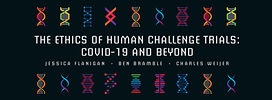Charles Weijer claims that challenge trials might not reliably speed the pace of vaccine development and vaccination and so they are unnecessary. Weijer also claims that challenge trials are morally unacceptable because they do not confer medical benefits, and he argues that paternalism is sometimes okay because there are some choices that people shouldn’t be able to make, even if they are fully informed, uncoerced, competent decisionmakers.
Consider first Weijer’s claim that “challenge studies could not have speeded the development of a vaccine and, consequently, they would not have saved any lives.” In support of this claim Weijer cites two influenza challenge studies which took 15 months (Memoli et. al, 2015) and19 months (Han et. al, 2019). These studies were both dose-escalation studies. The goal of the studies was to determine the optimal dose for subsequent influenza research by determining which dose would cause people to experience mild or moderate disease. Weijer argues that, in light of the time it takes to find the optimal dose for research, “had work on SARS-CoV-2 challenge studies begun when first proposed, we would still not be ready to test vaccines with them.” In support of this claim, Weijer cites a paper from the New England Journal of Medicine (Deming et. al, 2020), which says that the dose-escalation period, which is needed to determine the appropriate challenge dose, may take a long time.
On this point, it is worth noting that even if dose-finding studies take a long time, they could still be worthwhile. For example, the authors of the influenza dose-finding studies that Weijer cites affirm the value of this research in informing future challenge trials. They write,
It is clear that the human challenge model is an important tool to advance our ability to treat and prevent influenza. (Memoli et. al. 2015)
And,
The results reported here demonstrate that this model is safe and can induce MMID in healthy volunteers, and the challenge model can be used successfully to study pathogenesis and immunity. (Han et. al, 2019)
In the context of Covid-19, Deming et. al (2020) also support challenge trials, at least under some conditions. They argue that challenge trials can play a role alongside large, randomized, controlled trials:
A SARS-CoV-2 CHIM (Controlled Human Infection Model) could also address essential questions of SARS-CoV-2 immunopathogenesis, duration of vaccine-induced immunity, and correlates of protection in healthy populations. Parallel development of a potentially attenuated SARS-CoV-2 GMP virus, development of a seasonal coronavirus CHIM, and preparation for a SARS-CoV-2 CHIM would represent a broad and sustained research effort toward understanding coronavirus biology and mitigating the current and future pandemics.
This suggests that, even if dose-escalation studies did take as long as influenza dose-escalation studies, challenge trials could still meaningfully contribute to Covid research just as they can meaningfully inform influenza research.
But we should also question the claim that developing challenge trials must take a long time. Presumably, the lengthy period is in part due to the WHO guidance for dose-escalation studies, which recommends that researchers “try and achieve a 70% clinical attack risk for mild upper respiratory illness accompanied by shedding of SARS-CoV-2.” Yet there are alternatives to this approach to dose-finding. For example, researchers could also conduct low-dose challenge studies, which would not only reduce the dose-escalation period but would also be less risky for trial participants. Or, other researchers have proposed using non-human primates to determine the optimal challenge dose. Alternatively, researchers could also do challenge trials that expose participants to a natural strain through human interaction, where trial participants would be challenged by exposure to infected community members.
One of the reasons that Weijer is so skeptical of the usefulness of challenge trials is that traditional vaccine development methods have led to the production of successful vaccines. But for this development model to succeed, regulators suspended their “traditional’” requirements for approval and granted Emergency Use Authorization (EUA) for the vaccines. The FDA says that they expect manufacturers who received EUAs for their vaccines to “continue their clinical trials to obtain additional safety and effectiveness” before granting approval. Second, this development model was fast because the pandemic hastened the point at which hundreds of thousands of people were exposed to Covid in their communities and thousands of people died each day.
In addition to Weijer’s skepticism about the usefulness of challenge trials, he also argues that the medical risks necessarily outweigh the medical benefits of participating in a challenge trial because Covid carries a risk of long-term illness and death, while participating in a challenge trial does not confer medical benefits on participants. I deny the claim that medical risks and benefits are the only kinds of risks and benefits that matter in evaluating the ethics of a challenge trial. But even if we were to only focus on medical considerations, Nir Eyal has persuasively argued that some potential trial participants may reasonably judge that it’s medically worth it to participate in a challenge trial and receive high-quality care in a controlled setting rather than taking the risk of acquiring Covid in their community.
Weijer’s final point is that some paternalism is justified, such as policies that would prevent a person from taking a deadly risk for the sake of the greater good. Weijer argues that “physicians have obligations not to harm her and to promote her medical interests.” I deny this claim. Physicians have obligations to respect people’s choices and to promote their overall wellbeing. If patients have other values that conflict with their medical interests, physicians and policymakers should not force people to preserve their health at the expense of these other values. Of course, physicians may also have rights, in some contexts, to refuse to be complicit in procedures or research that they find morally objectionable. But even if physicians and researchers have rights to conscientiously refuse to participate in risky research and procedures, it doesn’t follow that they have rights to prohibit other willing physicians and researchers from giving volunteers the opportunity to participate in risky research.

